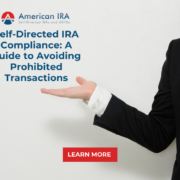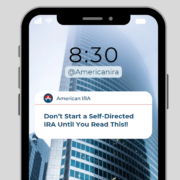Who is a Self-Directed IRA “Disqualified Person”?
Investing in a Self-Directed IRA comes with all sorts of great freedoms and flexible options. For example, you can use a Self-Directed IRA to invest in real estate. This opens up all sorts of retirement investment possibilities. You can use an IRA to invest in private companies, precious metals, tax liens, or even open brokerage accounts. You can do all sorts of things with a Self-Directed IRA—but you can’t transact with a “disqualified person” no matter what the investment is.
What does that mean? You may notice here at American IRA that we use the phrase “disqualified person” often when we want to explain what a Self-Directed IRA can’t do. But while you may know that a Self-Directed IRA can’t transact with someone like your spouse, you may not know the full consequences of this phrase. For that reason, let’s define the disqualified person.
Examples of Self-Directed IRA Disqualified Persons
First, let’s explain who the primary examples of disqualified persons may be. In this context, we’re referring to people with whom you cannot transact in an IRA, without creating substantial penalties and potentially requiring early withdrawals on the assets.
Spouses
- This one is easy: spouses are some of the closest relationships you’ll ever have and using an IRA to lend money to a spouse is obviously too close to home to be considered a valid retirement investment.
Children
- Similar to spouses, these relationships are too close, creating the obvious personal investment that retirement accounts should seek to avoid. A common one to avoid here, for example is renting out a piece of real estate property to a son or a daughter who might need a place to live. You can do so, but not using a real estate asset you hold within a retirement account.
Business connections
- Your employer, for example, is a business connection who would be considered a “disqualified person.” Business connections may also include anyone offering financial advice or custodian duties. For example, if you worked with American IRA to administer your Self-Directed IRA, you wouldn’t transact with us!
Business entities
- If you are at least 50% owner of a business entity, you would not be able to interact with that business—this includes corporations and partnerships, for example. If this were not the case, individuals could likely use these as “loopholes,” but this loophole is not available to retirement investors.
Why Can’t You Transact with Disqualified Persons?
To transact with any of the people or entities above would be considered “self-dealing” within a Self-Directed IRA, which leads to tax penalties. The reason for this is that you should only be using retirement assets for the purposes of retirement; that’s why the tax protections exist for these assets. If you were to start self-dealing through a Self-Directed IRA, you would then be going against the nature of the accounts, which in turn would negate their tax benefits. For this reason, retirement accounts are closed off to transacting with disqualified persons.
The good news? You don’t’ have to transact with disqualified people. You still have an entire world full of potential retirement assets that you can use. And you can transact with renters, for example, as long as they are not disqualified persons. Your IRA can correct rent via a property manager, for example, when you’re using real estate within an IRA.
Interested in learning more about Self-Directed IRAs? Contact American IRA, LLC at 866-7500-IRA (472) for a free consultation. Download our free guides or visit us online at www.AmericanIRA.com.






